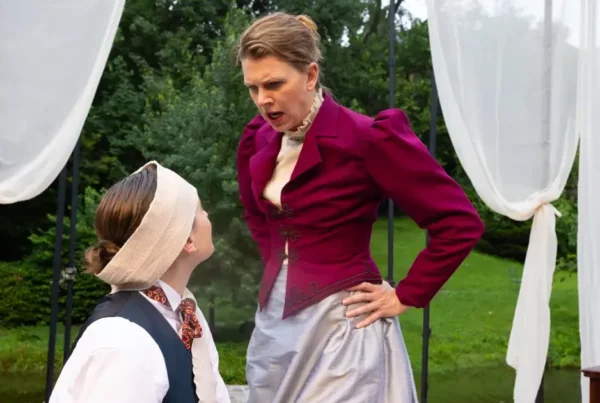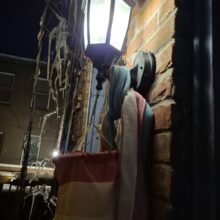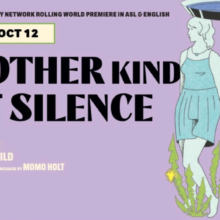Note: This play contains an incomplete and a completed suicide, not typical fare for a comedy as I describe it. Also, important content notes.
Also this might be slightly spoilerish for a play written 129 years ago.
It isn’t often that the location of a play is the setting. Quantum Theater’s production of ‘Seagull’ breaks that norm with a new adaptation set near the lake on the campus of Chatham University. Characters frolic and flee through the slightly wooded meadow in the background, the lake shimmering slightly but quietly. A pavilion functions as outdoor pavilions do around the world, especially for the landed gentry and their relations.
A perfect touch was added when some disturbance in the lake started a rabbit who darted into and out from the set to the delighted laughter of the audience and smothered smiles of the cast. It is unclear if the rabbit is Equity, but we hope restoration of the staging area includes a few bunny friendly plants.
The original play was intended as a comedy, but ended up defined as a tragedy and thus has a little something for everyone – unrequited loves, heartfelt speeches, bemoaning the lack of money whilst sipping tea served by a servant on one’s estate, and so so much youthful angst it could prove fertile grounds for a Netflix series with a Tchaikovsky influenced theme song. Addendum: I promise I wrote that paragraph before I realized there was a 2018 romcom movie version with Saoirse Ronan and Elizabeth Moss. Not queer, but oh my …
Uncle Sorin (Ken Boldin) is growing old and ill, but clings to life fiercely. His sister Irina (Lisa Velten Smith), an accomplished but aging actress, visits him bringing along her younger lover Trigorin (Brett Mack), a successful writer. Constantine, Irina’s twenty something daughter lives with her uncle, adopting many gender nonconforming ways. In the original play, Constantine is male. I think there were a few times Irina called her ‘Katerina’ implying Constantine was a chosen name.
Constantine is magnificent as she wrestles with her doomed love for Nina (Julia Rocha), her seemingly unsuccessful writing career, and the lack of consistent maternal attention. Everyone loves and/or respects her in their own fashion, but she is unsatisfied with her inability to translate her vision into the theatrical norms de rigueur. Or transform theater. She like many of the characters must be a creative. (Read my Q&A with Phoebe Lloyd.)
Her mother, Irina, also shines in this production. She’s vain, overbearing, and talented. The stage lit up when she entered with a glorious green skirt, part withering bitch and part captivating diva. In spite of her fear of aging, she was more threatened by the change Constantine’s new mode of plays (Symbolism) presents than the potential rise of younger actress, Nina. She can handle ingenues, but threatening her stage is not gonna fly.
The character of Masha (Maxine Coltin) was also queered to reflect her unrequited love for Constantine. The translation was not well-executed with Masha’s dour anger manifesting as simple pouting and an 1890’s goth girl aesthetic. It is fair enough that Masha’s unacknowledged and unexplored queer identity had no outlet – she seemingly was not artistic. And intentional or not, she provided comic relief, speaking bluntly when everyone else spoke in subtext.
The men sort of fade into the background. Shamrayev (Paul Anderson) the groundskeeper is much maligned by the others, but the only one working to preserve the farm, the family, and the food. His pragmatism never veered into exasperation, but remain ever fixed on his work. The actor gave a good performance of ’12 Angry Men’ earlier this year. Boldin (Sorin) was involved with my favorite production of the year Witch. Mack (Trigorin) was recently George Wickham with City Theater (of course he was!)
The parallels between Nina and Masha are interesting. Both grew up financially comfortable, but unsatisfied with their lives. Both made relationship choices that were unsatisfying. Both had given birth, one babe lost to this world, the other neglected by mother, mirroring the Irina/Constantine dynamic. They differed in their world views – Nina a romantic and Masha a realist – but ultimately both are unhappy in their own way. Both are queer, sleeping with and loving men and women for different reasons. Not so much two sides of the same coin as two paintings hung side by side in an antechamber where no one goes.
The play is set in three acts – the first, outdoors on the pavilion as they gather for Constantine’s new play and react in ways unsupportive to say the least. The second returns to the pavilion as everyone scurries about reflecting on making big choices, suggesting the ideas of the play may have unsettled them more than originally thought. Finally, the third acts take us inside the manse to the study Constantine uses for writing – Constantine has been published! She is reunited with Nina, the fallout of the big choices becomes clear.
This performance is marked with strong performances from Phoebe Lloyd and Lisa Velten Smith supported by a solid cast in general. It is interesting that Trigorin is considered by some to be one of Chekov’s greatest male characters. Yet with a simple reconfiguration of Constantine’s gender, Trigorin is rendered just the jerk.
Queering the play is far more than a simple trick. Queer and trans people existed in 1890’s Russia, but we don’t see them. Bringing them into the text helps the audience understand the quiet anguish of not being seen for who you really are, not just as an artist but as a human being. It also shows queer joy much like artistic joy, even amidst the chaos and angst.
The set is itself worthy of an entire review. Kudos to the design team. I found the costuming effective with the exception of Masha who deserved a rightfully angry queer 19th century woman glow up. A glimpse of Masha trying on pants, then rejecting them as not her kind of queer attire? I don’t want to rewrite Masha out of her despair, but help the audience understand that unrequited queer love in the 1890s Russia was not the same as our traditional understanding. It is not Ross and Rachel on location in Moscow.
I was very disappointed that the audience was almost entirely older white folx (like myself.) I remember more representation in previous Quantum productions. I didn’t even see any familiar queer theater going faces. The show was sold out, but still … are the Russian classics of no interest to local BIPOC theater fans?Perhaps the lack of representative casting is a factor – Russian interactions with the Ottoman Empire certainly paved pathways for contact with African nations, East Asia, Southeastern Asia, India, and more. And that doesn’t touch on the many Indigenous communities within the Russian borders at any given point in time. So beyond the characters being portrayed by BIPOC people, they could have been BIPOC characters. A missed opportunity that Pittsburgh theater companies make too often.
I choose comedy. The tragic ending, notwithstanding. The absurdity of their plaintive affairs and thwarted dreams. Complaining about the lack of carriage horses while the crops needed to be tended. The unexamined interior lives. The darting and dancing around the pavilion as lovers shared secrets and fled from the consequences. It was rather hilarious in spite of all the sincerity or perhaps because of the lack of sincerity – Masha was sincere in her misery and alcohol use.
And the titular seagull, really an ordinary gull as there was no sea. That seagull makes a hell of an entrance, landing with a forceful smack that said “this is no Chekhov’s gun.” Quantum made an odd choice for the obviously fake gull – it looked like a rubber chicken. A more realistic stand-in for the gull would be more effective. Although it does add to the humor.
Once again, Quantum Theater has given me an opportunity to rethink something I thought familiar. This could easily have been a Merchant-Ivory film, an Austen or Bronte novel, even an unfinished Edith Wharton novel. One can imagine Saoirse Ronan strutting about, pining for Cynthia Erivo.
But Russian. Russian literature, poetry, and playwrighting are a force of nature, a set of classics that warrant their own category -no one talks about Danish poetry or Turkish plays. Maybe we should? The Russians have imprinted in our consciousness not just a mimicry of Western lives, but the universality of the human experience in a social-culture that was not Western. Especially for affluent people who don’t know what they’ve got until it is really, really gone in the 20th century.
Russian queer and trans people experience brutal oppression now. Imagining that pain 130 years ago in a truly different world is worth consideration.
Seagull continues through August 17 at Chatham University. Tickets start at $20 for students. Register for rush tickets. You can bring a picnic if you like. We opted for Thai food first (in a garden) but brought a blanket to enjoy the pre-show festivities.






